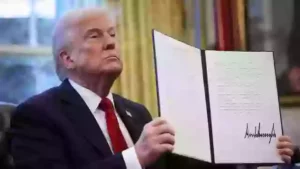In a bold move to reclaim America's trade advantage, President Trump celebrated the launch of a new reciprocal tariff policy, dubbed "Liberation Day,” aiming to level the playing field with countries that have benefitted from U.S. import taxes.
Trump Unveils New Tariff Policy: Aimed at Restoring Trade Balance

Trump Unveils New Tariff Policy: Aimed at Restoring Trade Balance
President Trump announces a significant shift in U.S. trade policy alongside Israeli PM Netanyahu, introducing reciprocal tariffs to enhance American trade sovereignty.
Standing next to Israeli Prime Minister Benjamin Netanyahu, President Donald Trump made headlines on Monday with the announcement of his unprecedented reciprocal tariff policy, set to take effect on Wednesday. Trump proclaimed that “virtually every country wants to negotiate” in light of the new measures, which he believes will dramatically reshape international trade dynamics.
Calling the previous week’s unveiling of the policy “Liberation Day,” Trump highlighted this moment as a critical juncture in restoring what he terms America’s trade sovereignty after years of perceived disadvantage through uneven agreements. The policy establishes a framework where the U.S. will impose matching tariffs on nations that impose high tariffs on American goods, directly challenging longstanding trade inequalities.
Trump asserted, “No more free ride,” as he emphasized that U.S. manufacturers will no longer foot the bill for unfair practices overseas. “If you charge us 25% to sell American cars in your country, we’re charging you the same,” he stated, underscoring the necessity of reciprocal trade practices in the current global landscape.
The bold shift has sent ripples through the global economic community, forcing both allies and adversaries to reassess their trade stances. Trump framed this policy as a strong return to fairness rather than a step toward isolationism, declaring that the U.S. will no longer be seen as “the world’s piggy bank.”
The implications of the new tariffs are particularly significant for countries like China and Germany, along with traditional allies who have previously enjoyed tariff advantages over U.S. products. The president noted that negotiations are already in motion, with global leaders expressing readiness to reduce trade barriers to maintain favorable relationships with Washington.
Supporters of the policy tout it as a crucial corrective measure against decades of globalist trade strategies. However, critics warn of the potential consequences, including retaliatory tariffs and increased prices for consumers. Trump, undeterred by these concerns, declared, “We’re not starting a trade war—we’re ending one that was quietly killing American jobs.”





















